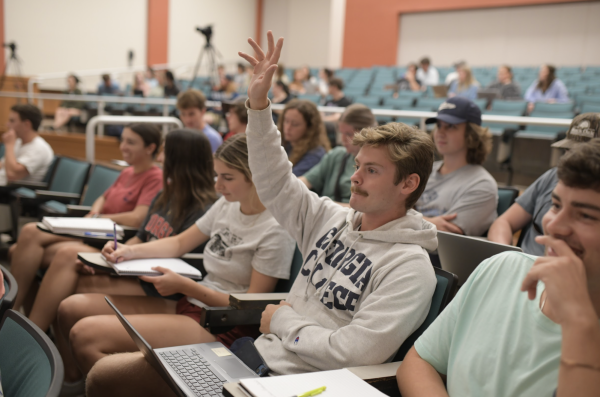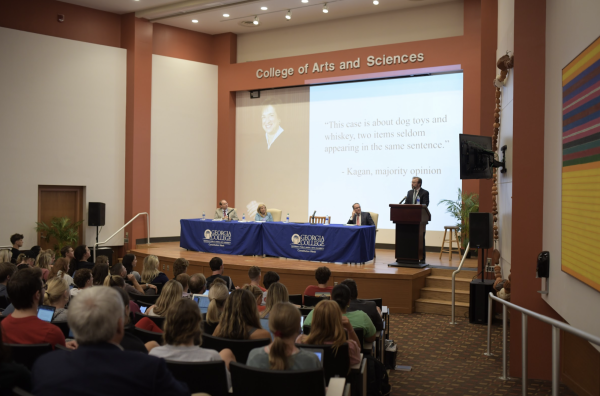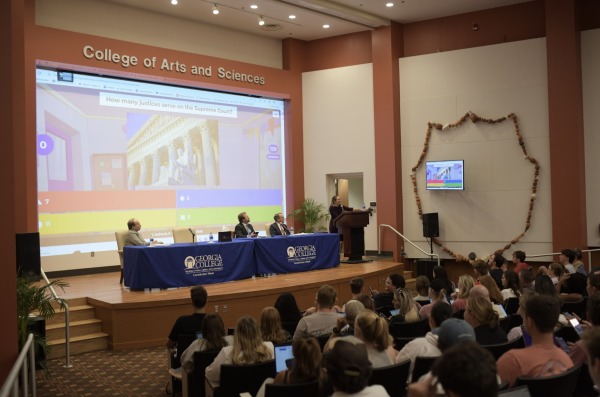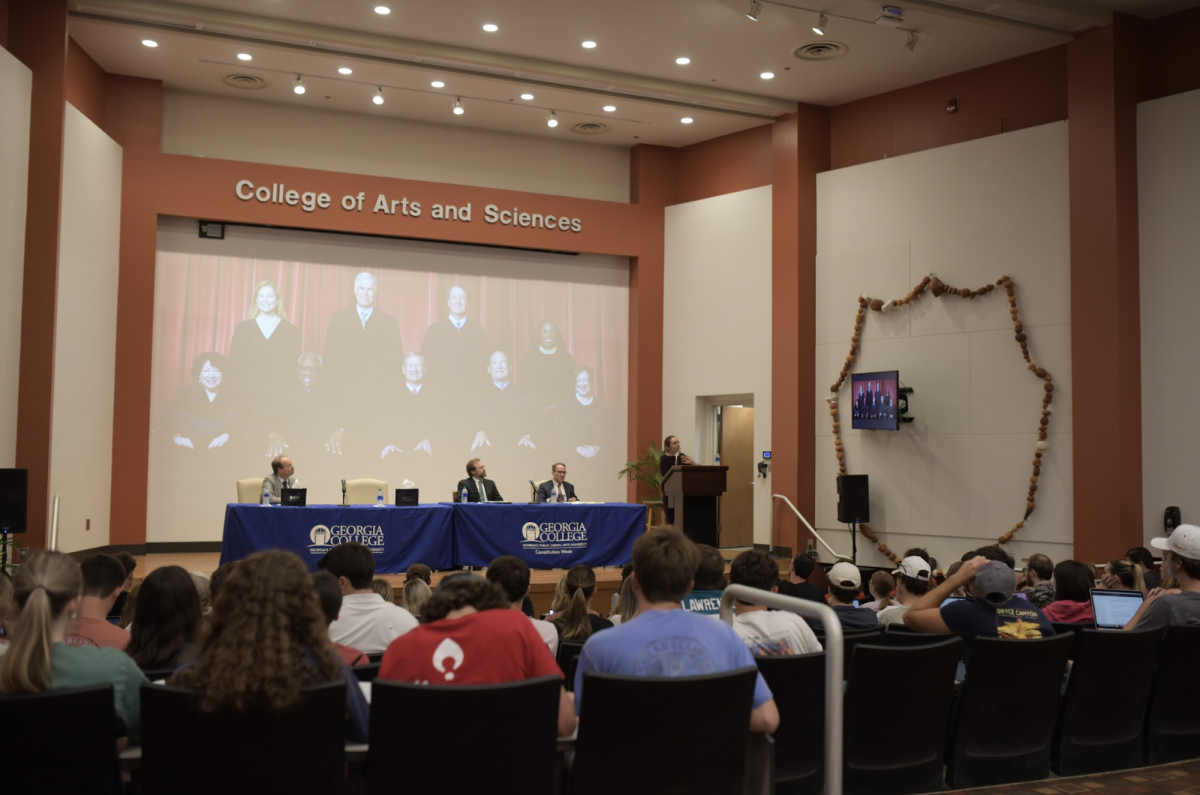Usery Forum on Leadership:
From 1998 to 2019, Senior Judge Peggy H. Walker served as the Chief Juvenile Court Judge in Douglas County. Over her impressive career, Walker has received the Commission’s Gender Justice Award in 2015, a Big Voice for Children award, Emory University’s EPIC Award for Unsung Devotion for Those Most in Need And the 2018 Georgia Supreme Court’s Amicus Curiae Award. Today, she serves as a Senior Judge for the Juvenile Courts of the State of Georgia.
Walker graduated from GC with honors and a bachelor’s degree in political science and education. She continued her education at Georgia State University and earned her master’s degree in education and Juris Doctor degree with honors.
Walker emphasized the importance of higher education and the significance of Constitution Week as a part of GC’s celebration and the continuing Usery Forum on Leadership, presented by the university’s leadership programs.
At the beginning of the panel, Walker shared a personal anecdote about her humble beginnings. A high school teacher claimed she was not intelligent enough to attend college. Instead, the teacher said Walker should learn secretarial skills and become a mom, because that was the expectation for women of the time. In response, this fueled Walker’s dreams for higher education even more. At every post-secondary graduation Walker had, her mother was sure to send the teacher a graduation invitation.
During her time at GC, Walker discovered her passion and purpose for foreign policy that carried into the rest of her career. Walker has been able to work in foreign policy affairs on the state, national and, over this past summer, international level. Recently, she was named one of GC’s most influential graduates.
Walker has worked tirelessly to change the lives of families across the state of Georgia through her time as president of the National Council of Juvenile and Family Court Judges and chair of the Georgia Commission on Family Violence. Currently, Walker serves on the Advisory Group for Safe Babies Infant and Toddler Courts for the state of Georgia.
Walker’s decade-spanning career working with the law has given her the utmost praise for the United States Constitution.
“It is highly unusual, other than in a few countries, to have embraced the common law and to have a constitution that stands the test of time the way ours has,” Walker said.
Walker claims the foundational document has remained “timeless, flexible, revered and upheld.”
“It is our job to uphold and defend the Constitution, particularly against attacks that attempt to undermine our democracy in recent years,” Walker said.
The End of Affirmative Action:
The 1978 Supreme Court case University of California v. Bakke set the precedent that using racial quotas for college admissions was unconstitutional under the Fourteenth Amendment’s Equal Protection Clause. However, under affirmative action, race could still be a factor in college admission decisions.
At the Constitution Week event, Adam Lamparello, an assistant professor of criminal justice at GC, mediated an affirmative action-based discussion between Dr. Brooke Rudow, a lecturer of philosophy and coordinator of Black studies at GC, and Javier Fransico, executive director of admissions at GC.
Today, there is the argument that race should still be a factor in college admissions. However, many are in favor of the colorblind approach, where only the student’s intelligence and individual lived experiences are taken into consideration. But this idea can undermine minorities, who are consistently at a predisposed disadvantage.

According to Lamparello, the colorblind approach is “inconsistent with the history of this country.”
Fransico expressed how the diversity of a student is more than just the student’s race. Other factors, such as the student’s socioeconomic class, upbringing and overall background must be considered for the holistic effort.
“The goal is to help that student go to college,” Fransico said. “I want to help that student become something.”
Dr. Rudow shared her thoughts on how it is hard to find a utopian balance with so many considering factors.
“Trying to lay just laws on a society that is already imbalanced perpetuates that imbalance,” Rudow said.
The consensus on the conversation of affirmative action is decade-spanning and will continue if society strives for higher education.
Times Talk: Climate & Politics:
A weekly tradition at GC for years, Times Talk has provided students with a space for community-wide discussion over a multitude of topics. This week, as a part of Constitution Week, Dr. Steve Elliott-Gower, an associate professor of political science at GC, facilitated a discussion regarding climate and politics.
Gower has taught several classes that look at climate politics in depth. During his Times Talk, he covered what climate change looks like, its effects on people and how this affects politics on an international, national and subnational level.
“There is a lack of education on climate change, even though it is changing the world that we are living in,” Gower said. “It’s overwhelming in its psychology and content because of the mass information: fires in Maui, flooding in Greece and in Libya, forest fires in the west. It’s a tsunami of information.”
He looked at climate change in terms of its causes, sources, effects, impacts and, specifically for politics, responses to climate change.
There are direct, primary effects that we are acutely aware of, like flooding and fires, but less so about its secondary effects, or “knock-on effects.”
“The three D’s: death, destruction, disruption,” Gower said. “There’s food insecurity, local migration, rising food prices, loss of biodiversity, impacts of public health, increasing or no home insurance rates because it’s getting too expensive for them to cover low-lying homes in Florida.”
With climate change, there are a number of issues that will arise, including a rise of bubonic plague. With the melting of ice, old carcasses from animals that carried diseases are being unfrozen, giving space to these old diseases.
Due to the different priorities of every country, responses have looked different worldwide. There is climate adaptation across the globe, like China’s sponge cities, meant to be climate-resilient and to take in a lot of water. The U.S. has been building climate-resilient buildings and adding more climate safety standards to building regulations, like having fire retardant material and having storm surge resilience.
On a higher tech level, Gower discussed geoengineering in terms of climate change resolutions.
“They throw reflective particles in the air to deflect the sun’s rays,” Gower said.
He describes this concept as something that should be carefully done. The purpose of this is to cool down the Earth’s surface. While this is one response for climate resolutions, other ideas have been more difficult to implement because of politics.
“Politics obstruct progress in climate change,” Gower said. “COP [Conference of the Parties] meets once a year to discuss climate change treaties and greenhouse gas emissions targets. These countries’ pledges have not been fulfilled. International cooperation is difficult because countries have different national interests. With the emergence of great power rivalry, the U.S., China and Russia, COP has become even more difficult.”
Countries are afraid of other countries gaining more power economically. There are plenty of other factors that contribute to this difficulty of resolving the devastating impacts of climate change: the burden of responding to climate change, ethical conundrums, the vast influence of the oil and gas industry and the fundamental disagreements about who is responsible for climate change.
While there are different efforts, or lack thereof, worldwide for climate change resolution, there remains the constant issue of the political polarization of climate action which will stymie climate progress.
Supreme Court Review Panel:
This Constitution Week event had a panel that looked at a variety of different Supreme Court cases:
Judge Ben Land, who serves on the Georgia Court of Appeals, covered Sackett v. EPA, a case about wetlands and CWA.

Matt Roessing, a senior lecturer of Legal Studies at UGA who covered Jack Daniel’s Properties, Inc. v. VIP Products LLC, a case about parody and trademark.
Jen Jordan, who serves as a political and legal commentator for media outlets including the Atlanta Journal-Constitution, WABE, MSNBC and CNN, who covered 303 Creative LLC et al. V Elenis et al. discussing first amendment and anti discrimination law.
Judge Stephen Bradley, who serves on the Ocmulgee Judicial Circuit Superior Court, covered Twitter, Inc. V. Taamneh and Gonzalez v. Google (Communications Decency Act).
Time for Changes in the U.S. Supreme Court?:
The call for reform in the U.S. Supreme Court has been a hot topic of conversation in recent years due to public dissatisfaction with their decisions. While public dissatisfaction in the court’s decisions has always existed on some scale, the public confidence in the Supreme Court has sunk to a historic low, at 25%, according to a Gallup poll in 2022.
This panel focused on answering questions explaining the Supreme Court’s historic functions and purposes and gave their thoughts on ideas like having a mandatory retirement age.
Beginning with the purpose of the Supreme Court, the panelists described what the goals of the system have been historically and how their purpose remains important now.
“John Adams describes the goal of our system as a government of laws and not men,” said Randy Beck, Justice Thomas O. Marshall Chair of Constitutional Law at the University of Georgia School of Law. “They should be governed by the laws by the people and not the whims of who is holding power in that moment.”
More than just the goals, Beck emphasizes the importance of the Supreme Court’s job in holding others accountable.
“They are the judges, the referees, to make sure people stay within the rule,” Beck said. “They hold federal and state leaders accountable in law and ensure uniformity in interpretation of the federal law.”
Looking back historically, the panel explained what the Constitution and our founders say about the Supreme Court.
“Article 3 of the Constitution describes it as an afterthought,” said Nicholas B. Creel, GC Assistant Professor of Business Law & Ethics. “It finds the power of the court in its legitimacy. We need the federal judiciary for its structure.”
According to our panelists, not much is said about the Supreme Court historically, as it remains one of the shortest parts of the Constitution.

”The Constitution is silent in the number of justices and left it to Congress,” said Benjamin Clark, Senior Lecturer of Political Science in the Department of Government and Sociology at GC. “It hasn’t always been nine. It fluctuated over time and in 1837, it was set to nine. It fluctuated some more during the Civil War and Reconstruction Era, but it has been consistently nine.”
There were presidential frustrations with the Supreme Court and wanting to adjust the size, but ultimately, maintaining the independence of the court has remained a priority.
“In 1930, Roosevelt was frustrated about the New Deal Agenda and wanted to change it,” Clarke said. “There was a norm against expanding the size of the Supreme Court; the idea of the President or Congress not having the power to interfere with the independence of the court.”
How independent the court is, though, has stirred up conversation if they should remain that way. Clarke discussed the benefits and the problems that come with lifetime appointments, until they resign, die, are impeached or convicted, and the independent structure of the court.
“The benefit is judicial independence,” Clarke said. “Justices are not beholden to Congress or the President because they don’t need to worry about being reappointed. They are free to follow the Constitution and law, even when it’s unpopular.”
Without lifetime appointments, there is a strong likelihood that the justices would move into a private sector. Clarke mentions the problems that could arise from this, like how their former decisions could affect their future employment. Though with the lifetime appointments, he mentions how there is less accountability, democratically.
“Nominations recently have been highly politically charged, because of the high stakes involved,” Clarke said.
Though not having lifetime appointments, reducing the time they hold a position in the court, would remove the pressure from the nominations, there was a disagreement across the panel of having a mandatory retirement age.
“There have been concerns with age, like with Mitch McConnell, but it would require a constitutional amendment, which is a high bar,” Clarke said. “Having a mandatory retirement age without term limits, justices will be picked younger and younger, and less qualified, so they can stay on the court longer.”
There was a strong emphasis on the importance of preserving the court’s independence, in terms of a mandatory retirement age and term limits which can affect the court itself.
“In preserving its independence, there is no worry about the political ramifications of their decisions and their future political careers,” Beck said. “The Supreme Court is an anti-democratic institution; it does not reflect the majority and it can be minoritarian.”
The panelists further detailed how maintaining the independence of the court is important in keeping the power away from the passions and ambitions of the White House and political majority at the time. While hopes for changes in the Supreme Court remain high in conversation, the panelists explained the difficulties of doing so because of the strong independent power that they hold.


